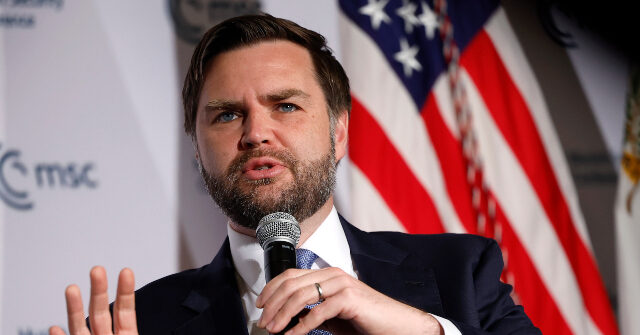WASHINGTON–Vice President JD Vance warned Wednesday that if Iran does not strike a deal with the United States to end its nuclear program, it will face a “very bad” alternative, as the United States is committed to ensuring Iran does not obtain nuclear weapons.
Vance’s comments came on Wednesday during a question-and-answer session with former Munich Security Conference (MSC) chair Wolfgang Ischinger at the MSC’s Munich Leaders Meeting in Washington, DC.

“…The president has said this, we think that there is a deal here that would reintegrate Iran into the global economy, that would be really good for the Iranian people, but would result in the complete cessation of any chance that they can get a nuclear weapon,” Vance said. “And that’s what we’re negotiating towards.”
“And as the president has said, that’s Option A… If Option A is very good for the Iranian people, and even, you know, some of … the leadership in Iran, Option B is very bad,” he added. “It’s very bad for everybody, and it’s not what we want, but it’s better than Option C, which is Iran getting a nuclear weapon. That is what is completely off the table for the American administration, no ifs, ands, or buts.”
Vance pointed out the threat of further nuclear proliferation if Iran hypothetically obtained a nuclear weapon.
“Now, there are a couple of other things that are worth thinking about because this is not just about Iran,” Vance said. “If Iran gets a nuclear weapon, which country then next gets a nuclear weapon, and then when that country gets a nuclear weapon, which country after that?”
“We really care not just about Iran, but about nuclear proliferation,” he added.
Vance referenced what he believes is Trump’s openness to discuss limiting nuclear supplies with Russian President Vladimir Putin and Chinese President Xi Jinping.
“The president hates nuclear proliferation. I hate nuclear proliferation,” Vance said. “And I think that the president would be very open to sitting down with the Russians and the Chinese and saying, ‘Look, let’s get this thing in a much better place. Let’s reduce the number of nuclear weapons that are in the world writ large.’”
“That’s obviously not a conversation for tomorrow. That’s a conversation, God willing, for a few years from now. But there is no way you get to that conversation if you allow multiple regimes all over the world to basically enter this sprint for a nuclear weapon,” he added.
Vance also laid out multiple issues that were part of the Iran Nuclear Deal under the Obama administration.
“Number one, the enforcement or the inspections regime was incredibly weak, and I don’t think that it actually served the function of preventing the Iranians from getting on the pathway to a nuclear weapon,” he said.
The other issue, Vance said, was that the administration believes the previous agreement preserved some elements of Iran’s nuclear program that “allowed Iran to sort of stay on this glide path towards a nuclear weapon if they flip the switch and press go.”
Read the full article here


